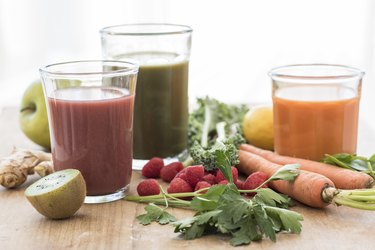
If you want to include juice as part of a healthy weight-loss plan, the best juice for weight loss is one that is naturally lower in calories and high in nutrients that can help you shed pounds.
Explore what juice is good for weight loss below.
Video of the Day
Video of the Day
1. Lemon and Lime Juice
Despite the glowing health claims you might see online, lemons and limes don't burn fat. But the juice from these citrus fruits is relatively low in calories, so it's a good way to add flavor without extra sugar or calories.
An ounce of either lime or lemon juice has fewer than 10 calories, per the USDA, and you can easily mix it into a glass of water or seltzer for flavored "juice" with a fraction of the calories of typical fruit juice.
While there's not much evidence to show that lemon juice can help you lose weight, there's plenty of evidence that water helps with weight loss.
A September 2015 study in Obesity found that drinking two cups of water 30 minutes before a meal helped a group of people with overweight and obesity to lose nearly 3 pounds more than the control group over a 12-week period. If plain water is not your thing and you're trying to lose weight, squeezing a little lemon juice into your glass may help you drink more and help you reach your weight-loss goals.
Lemon juice is also a great addition to tea and can be used to replace sweeteners to make the sometimes-bitter beverage more palatable.
Lemon and lime juices also offer a generous amount of vitamin C, per Berkley Wellness, which might support your weight-loss goals. Vitamin C can affect your metabolism, and it may actually help you burn fat during exercise, according to an older August 2006 study in Nutrition & Metabolism. The study authors found that low vitamin C levels lower fat-burning capacity during exercise by 25 percent and that boosting vitamin C levels restored normal fat burning.
One thing to be cautious of here: The acid in these juices can damage your tooth enamel, the covering that protects against cavities, sensitivity and other kinds of damage, per Watts Family Dental. For this reason, you'll want to drink these citrusy juices in moderation and dilute them with water rather than drinking them straight.
2. Beet Juice
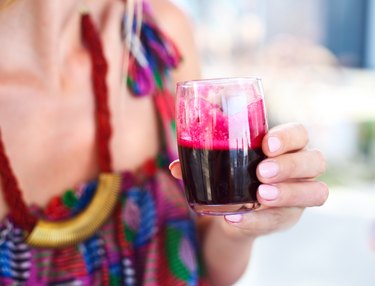
Raw beets can be made into fresh juice using a juicer, extracting the nutrients from the root vegetable. This makes for an easy way to consume the health benefits of beets.
A one-cup serving of raw beets makes about one-half cup of fresh beet juice. While you're better off eating beets than drinking beet juice, the juice can fit into a healthful eating plan.
Beets are naturally sweet-tasting, so substituting fresh beet juice for a sugary drink, such as soda, can help reduce the amount of added sugar you're eating, which can help with weight loss over the long term.
One cup of beet juice has 110 calories and 22 grams of sugar, per the USDA, while a 12-ounce can of cola contains 156 calories and 37 grams of added sugar. Added sugars are considered empty calories, per the American Heart Association (AHA), as they have no nutritional benefit, whereas the natural sugars found in beet juice contain certain essential minerals and vitamins.
3. Cabbage Juice
Cabbage juice can be rich in dietary fiber and is naturally low in calories, making it a healthy weight-loss beverage.
To make 1 cup of cabbage juice, juice 1 cup of chopped cabbage and mix in one-quarter cup of fresh water and the extracted fiber from the juicing process.
Store cabbage juice in an airtight container in the fridge for up to five days. You can drink cabbage juice at any time of day, although because of its strong taste you may wish to blend it with milder juices, like cucumber or apple juice.
Of course, an all-cabbage-juice diet isn't a healthy idea. As with other vegetable-based juices, drink cabbage juice in place of higher-calorie beverages — including commercial fruit juice — to help you lose weight.
4. Cucumber Juice
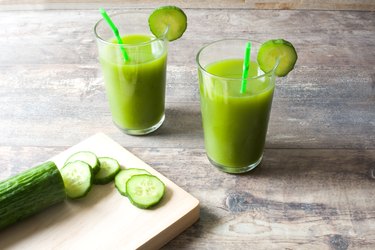
Cucumber juice has benefits for weight loss because it's a refreshing way to hydrate without too many calories or sugar. One 8-ounce serving of cucumber and lemon juice, for example, contains 19 calories and 4 grams of carbohydrates, per the USDA — a significantly lower amount than a sweetened fruit beverage or cola.
You don't need to juice a cucumber to get its benefits, as the veggie is incredibly water-rich. A cucumber is 95 percent water, per the USDA, and contains nutrients like vitamin K, potassium and magnesium.
And remember, water is key for weight loss: A February 2010 study in Obesity found that adults who drank extra water lost more than 4 pounds more body weight than their less-hydrated counterparts.
Related Reading
5. Tomato Juice
Tomato juice for weight loss? You bet. It's a great alternative to higher-calorie beverages. A 12-ounce serving of tomato juice has 60 calories, beating out the standard sugar-sweetened soda, which boasts around 150 calories per serving, per the USDA. Tomato juice is also packed with nutrients and is considered a good source of calcium, vitamin C and iron.
If you're choosing store-bought tomato juice for weight loss, be mindful of its sodium content. A 6-ounce can of regular tomato juice, which contains added salt for flavor, contains 460 milligrams of sodium, which is 19 percent of the daily value. Tomato juice with no salt added, on the other hand, has just 18 milligrams of sodium.
Tomato juice is not considered as nutritious as whole tomatoes, because juicing removes the fiber from fruits and vegetables, according to the Mayo Clinic. That's a problem because foods with high fiber take longer to digest than foods lower in fiber, which in turn helps you feel full for longer. So enjoy your tomato juice, but don't use it as a substitute for whole vegetables (and probably best to stay away from anything resembling a "tomato juice diet").
6. Prune Juice
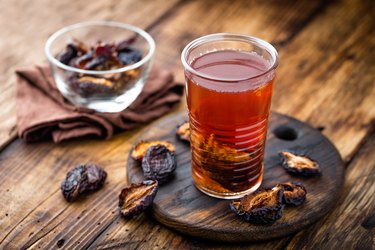
Prune juice is something of an anomaly. Unlike other kinds of juice, it isn't made by extracting juice from fresh fruit. Instead, prune juice is made from dried plums that have been pureed and liquefied in hot water. While the highly concentrated beverage has its benefits, drinking prune juice to lose weight probably isn't one of them.
You'll get just over 180 calories from a cup of unsweetened prune juice, according to the USDA. This makes prune juice roughly 40 percent higher in calories than the average fruit juice, which supplies about 110 calories per cup. Liquid calories are absorbed more quickly — and are therefore less satiating — than those obtained from food.
Prune juice is known to have a laxative effect, as it is rich in sorbitol, an indigestible sugar alcohol that stimulates the bowels, per a 2013 review in Critical Reviews in Food Science & Nutrition. While small amounts of sorbitol promote regularity, consuming larger quantities has a laxative effect that can lead to loose, watery stools. Laxative-induced diarrhea may help you lose some water weight, but the results are temporary and don't affect body fat.
Eating prunes may be more beneficial than drinking prune juice for weight loss (seeing a trend here?). As a good source of fiber, prunes are a relatively satiating snack that can help stave off hunger and prevent overeating. As with all dried fruit, however, portion control is important — a 1/4-cup serving of prunes has about 100 calories.
Related Reading
7. Cranberry Juice
One of the reasons there are musings around cranberry juice and weight loss involves research that has looked into the juice's effect on cholesterol, like one March 2007 study published in the British Journal of Nutrition. Researchers suggested that flavonoid-rich foods, like cranberries, can promote heart health.
Even so, there's no scientific evidence to suggest that cranberry juice can help you lose weight. The juice does, however, contain many antioxidants beneficial to your health, so including cranberry juice in your diet can help in combating certain infections and diseases.
One cup of cranberry juice cocktail contains 137 calories and 30 grams of sugar, per the USDA, so this vibrant beverage should really be drunk in moderation. One popular way to use cranberry juice is to add it to a glass of water, carbonated or still. Doing so will add beautiful color to your H2O with just a fraction of the calories and sugar of the juice.
Preventing urinary tract infections is by far the most common use of cranberry juice, per the Memorial Sloan-Kettering Cancer Center, but more research needs to be done on how effective it really is.
8. Orange Juice
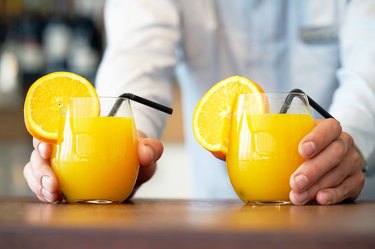
While orange juice may be high in vitamins and minerals, it's also calorie-dense, meaning it's easy to consume too much of it. That's why orange juice for weight loss isn't your best bet.
An 8-ounce serving of orange juice contains 110 calories, the majority of which comes from sugar. Ounce for ounce, this is only slightly less than chocolate milk, lemonade, cola and sugary energy drinks.
One of the main downsides to drinking orange juice is its sugar content. Excess sugar consumption can raise blood sugar levels, which can hinder your weight loss.
Orange juice can be part of your weight-loss diet, but because it's easy to overconsume and doesn't fill you up, it may be best to avoid this juice. For a more filling, yet naturally sweet snack, eat an orange instead. You get all the vitamins and minerals the juice contains but with added fiber, which keeps you feeling full.
9. Lauki Juice
Lauki is part of the cucumber family and grows in many of the warmer areas of the world, including in some parts of the United States, such as Florida. The variety that is long and narrow is best for eating, and those that are club-shaped or round are best for making containers.
While you may have seen some exciting headlines about the slimming properties of lauki, there isn't a lot of scientific evidence to support the use of lauki juice for weight loss. What does exist is very preliminary: A September 2012 study done on rats in the Asian Pacific Journal of Tropical Medicine found that lauki helped to minimize weight gain in rats fed a high-fat diet. Further research is necessary to verify that the same occurs in people.
There are several risks associated with drinking lauki juice, including bleeding stomachs, nausea, ulcers, diarrhea, vomiting blood, abdominal pain, liver and kidney problems. To limit risk, it's recommended to drink lauki juice that has been cooked, and to avoid consuming lauki juice that tastes bitter. The bitter taste comes from the cucurbitacin compounds in lauki that are toxic to people; however, the compounds can be deactivated by cooking.
Even then, it's best to drink no more than about 3 ounces per day, recommends an August 2012 article published in the International Journal of Nutrition, Pharmacology, Neurological Diseases.
Given the risks, it may be best to skip lauki juice and choose other types of beverages as part of your weight-loss plan.
10. Chia Juice Spritzers
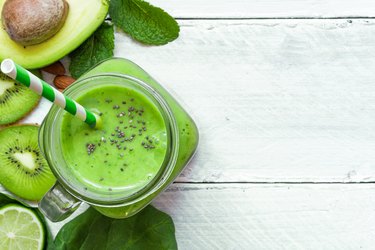
Liquid calories, like juice, aren't satiating — so you take in calories without getting that "full" feeling as a reward. However, you can boost your fullness when drinking juice by adding dietary fiber.
Getting enough fiber is key to feeling full and losing weight; just aiming to eat 30 grams of fiber each day can help you lose weight, lower your blood pressure and improve your body's response to insulin just as effectively as a more complicated diet, according to February 2015 study in Annals of Internal Medicine.
Stirring one half-ounce of chia seeds into your low-calorie juice adds about 5 grams of fiber, or 19 percent of the daily value. You'll also get 9 percent of the daily value for calcium — a mineral linked to fat loss, according to a September 2012 paper in Obesity Research.
How to Make a Chia Juice Spritzer
Combine a half-ounce of chia seeds with an ounce of unsweetened cranberry juice, lemon juice or lime juice and a cup of sparkling water.
Drinking Juice for Weight Loss
While juice seems like a healthy pick — especially the enticingly vibrant blends you can buy at health food stores and juice bars — it's not necessarily your best bet for weight loss.
Juice contains all the vitamins and minerals from whole fruits and vegetables, so it serves as a source of nutrients, but the juicing process strips fiber from the fruits and vegetables. Fiber is a key ingredient for weight loss: It slows down digestion and helps your body absorb nutrients.
Juices also contain all the natural sugars of the food, which makes it relatively high in calories, per the Harvard T.H. Chan School of Public Health.
A healthy diet isn't about deprivation; you can still enjoy your favorite juices, even if they're higher-calorie fruit juices, as long as you do so in moderation.
Juices can be as high — or even higher — in calories as overtly unhealthy beverages like soda. For this reason, you should be mindful of the liquid calories that make up your total daily calorie intake and take care to measure out portions to ensure you don't drink more than you intended.
One of the best ways to reduce the calorie content of your juice is by diluting in water. A mixture of half orange juice and half sparkling water, for example, still lets you enjoy the juice's flavor, even though you're taking in just half the calories. If you're making juice from concentrate, add an extra can or two of water for a more dilute, lower-calorie juice.
Ready to Lose Weight?
Set yourself up for success with LIVESTRONG.com's Weight-Loss Kickstart program.
- Harvard School of Public Health: Sugary Drinks
- Nutrition & Metabolism: "Marginal Vitamin C Status Is Associated With Reduced Fat Oxidation During Submaximal Exercise in Young Adults"
- USDA National Nutrient Database: Nutrient Lists
- Nutrition: "Dietary Fiber and Body Weight"
- Berkley Wellness: "Lemons and Limes: Flavorful Vitamin C"
- Watts Family Dental: "Does Drinking Lemon Water Have a Bad Effect on My Tooth Enamel?"
- USDA: "Tomato Juice"
- Mayo Clinic: "Is juicing healthier than eating whole fruits or vegetables?"
- Asian Pacific Journal of Tropical Medicine: "Lagenaria siceraria fruit extract ameliorate fat amassment and serum TNF–in high–fat diet–induced obese rats"
- International Journal of Nutrition, Pharmacology, Neurological Diseases: "Bitter bottle gourd (Lagenaria siceraria): Healer or killer?"
- USDA: "Prune juice, canned"
- Critical Reviews in Food Science & Nutrition: " Dried plums and their products: composition and health effects--an updated review"
- Obesity: "Efficacy of water preloading before main meals as a strategy for weight loss in primary care patients with obesity: RCT"
- British Journal of Nutrition: "Favourable impact of low-calorie cranberry juice consumption on plasma HDL-cholesterol concentrations in men"
- Memorial Sloan-Kettering Cancer Center: "Cranberry"
- USDA: "Cranberry juice cocktail"
- USDA: "Orange Juice"
- Obesity Research: "Calcium and Dairy Acceleration of Weight and Fat Loss during Energy Restriction in Obese Adults"
- USDA: "lemon juice"
- USDA: "Beet Juice"
- American Heart Association: "Added Sugars"
- Obesity: "Water Consumption Increases Weight Loss During a Hypocaloric Diet Intervention in Middle-aged and Older adults"
- Annals of Internal Medicine: "Single-Component Versus Multicomponent Dietary Goals for the Metabolic Syndrome"
- USDA: "ORGANIC CUCUMBER GLOW CUCUMBER & LEMON JUICE BLEND, CUCUMBER & LEMON"
- USDA: "Cucumber, raw"